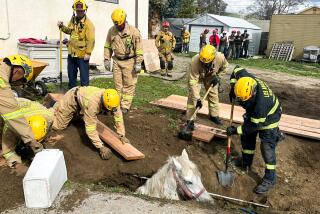Horses and inmates tame each other
A short pickup ride from the barbed wire and cellblocks of a state prison complex, the inmate and the mustang face off in a small fenced circle. In many ways they are alike. Once wild, now captive, both man and horse can learn a lot from each other about being tamed.
Terry Benjamin, a lanky 45-year-old, is doing a 10-year stretch for armed robbery. He steps silently into the corral, willing himself calm as the new arrival from Wyoming, a dappled gray mustang tagged No. 7611, tears across the pen in panic.
With a slow, steady motion, Benjamin raises a stick with strips of cloth tied to the end. He never says a word, never touches the horse. But the movement is enough to interrupt the horse’s frenzy, soothing it enough so Benjamin can coax the horse to switch course and run counterclockwise.
A grin spreads across Benjamin’s face at the small but significant accomplishment. Changing direction is nearly always a first step toward redemption.
For 25 years, the federal Bureau of Land Management has been quietly shipping thousands of wild mustangs it rounds up each year to the East Canon Correctional Complex near Canon City for an unusual effort called the Wild Horse Inmate Program.
The horses come from herds across the West, the majority from Nevada, Wyoming and California. Once they arrive at the prison’s vast acreage they are checked over and their fates determined: They are trained as pets or working ranch horses to be offered for adoption, or they are set loose in long-term pastures scattered across the country.
Of the 2,000 or so horses at the prison at any given time, only about 10 a month are selected for training. It takes three to four months to take a horse from feral to friendly.
Some horses end up working for the government.
Four years ago, Lee Pinkerton, a retired U.S. Border Patrol supervisor, got the idea that these newly trained mustangs, with their compact bodies and heavy feet, would be perfect for patrolling the rugged terrain of the nation’s borders. And they would be a bargain to boot. Each trained horse costs the Border Patrol $1,025 — less than half what it had been paying for its horses previously. So far, 84 Canon City horses have been bought by the Border Patrol and an additional 90 are expected to be bought by year’s end.
Cody West, in his signature chocolate-colored cowboy hat and leather vest, is supervisor of the inmate horse training program. It’s gut instinct, he says, to know which horse is a good candidate for training, just as it is gut instinct to know which prisoner should be doing the training.
He favors the 2- to 3-year-old horses because they are more malleable; he favors inmates who don’t have a lot of horse experience for the same reason. No bad habits to overcome. He is of “The Horse Whisperer” sensibility and doesn’t like the concept of “breaking” horses. He says horses, not unlike prisoners, need to be “prepared” for a new life.
“It teaches you patience,” says James Hershey, 31, an inmate cowboy serving a 4-year sentence for drug possession. That newfound virtue will come in handy back in general population. He finds special joy in watching a horse relax over time and begin to trust. “You can actually see their eyes soften,” he says.
There are 55 inmates who work in the program each day, rising early and traveling the short distance from their minimum restricted facility to the fresh air and elbow room of horse duty. They earn from 60 cents to $2.50 per day, working their way up from mucking stalls to wrangling mustangs. There has been only one escape attempt, and it was on foot, not horseback.
Many of the inmates become attached to the horses, giving them names like Jughead or Grizzly, depending on temperament. Nearly all of the men have been kicked or thrown at one time or another. But they don’t hold grudges. They understand all too well what it feels like to be trapped and frightened.
“They don’t necessarily want to be here either,” says Paul Frasure, a 39-year-old doing time for grand larceny and parole violation. “But if I can make them comfortable while they’re here, well, then it makes me feel better about being here too.”
Deam writes for The Times.
More to Read
Start your day right
Sign up for Essential California for news, features and recommendations from the L.A. Times and beyond in your inbox six days a week.
You may occasionally receive promotional content from the Los Angeles Times.






